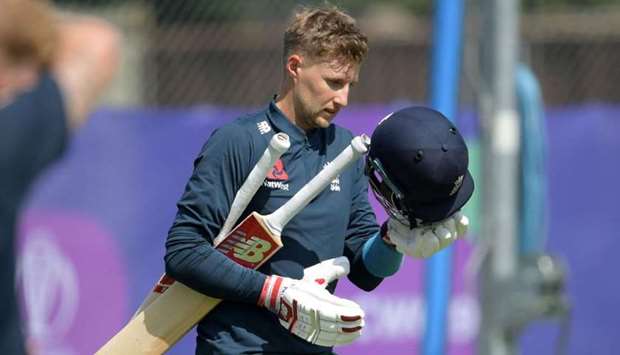Despite the early spring chill, English cricketers would normally be turning their thoughts to outdoor practice. Instead, they face a prolonged period in limbo.
The impact of the coronavirus means there will be no sound of leather on willow and no hardy supporters wrapped up in woollies braving the bitter early-season conditions.
Last week the England and Wales Cricket Board (ECB) announced that no professional cricket would be played before May 28 at the earliest. The traditional County Championship, comprising four-day first-class matches, has long had to co-exist with a range of other limited-overs, or white-ball, formats.
And this season the plan was to throw the Hundred into the mix, with a cast of high-profile overseas stars including Australia Test captain Steve Smith.
ECB chiefs were hoping the Hundred – a 100 balls-per-side tournament featuring eight new franchises, all with men’s and women’s teams – would attract a new audience.
Former England captain Nasser Hussain has suggested the Championship, much less lucrative for the counties than the Twenty20 Blast, could be scrapped in an unprecedented peacetime move in response to the shortened season.
“One thing the ECB will have to do is prioritise the financial decisions in all this – Test match cricket, white-ball cricket,” he told Sky Sports.
“Maybe the purist will just have to suck it up this summer with the County Championship. These are the decisions the ECB will have to make with their stakeholders and their partners.”
The first-class Championship is the proving ground for the five-day Test format but is often played in front of sparse crowds.
Income from white-ball cricket, plus broadcast and commercial revenues from international matches helps keep the 18 first-class counties afloat.
The immediate focus is on options for cricket in June including the three-Test series against West Indies, the Twenty20 Blast and the England Women’s schedule against India.
Pakistan are also due to play three Tests later in the English summer and Australia have been booked in for several limited-overs matches. The ECB is modelling a series of options to start the season in June, July or August as it scrabbles for a solution to a shortened summer.
“Alongside our partners in the game, we continue to plan against a number of scenarios for the cricket season,” an ECB spokeswoman told AFP.
“It is difficult for us to be sure of what outcomes the game might be expected to deal with.
“These could include the possibility of playing matches behind closed doors, or potentially postponing or cancelling further elements of the season.”
Durham chief executive Tim Bostock said if the season were reduced to just two months, it would be better to launch the Hundred next year.
“It’s pretty clear international cricket comes first then after that it’s the (Twenty20) Blast and the Hundred. That’s where the revenue is,” Bostock told Talksport radio after talks between the counties and the ECB.
“Tom Harrison (ECB chief executive) has been really pragmatic. I certainly get the impression if we get a two-month season the pragmatic view would be what’s the point of launching this competition now? Let’s launch it properly next year. I think we’re all on the same page.”
Reigning county champions Essex have suggested regional games between neighbouring teams as a way of keeping first-class cricket going if the usual two-division format has to be abandoned.
“Spectators and members would love that and it would also give us some four-day cricket to support England’s Test series in a very tight schedule,” Essex chief executive Derek Bowden told Sky Sports.
England skipper Root still in training despite virus
There may be no training nets for them to attend right now but England captains Joe Root and Heather Knight are still following personalised programmes even though no one knows when they will play cricket again.
Last week the England and Wales Cricket Board announced a seven-week delay to the start of the 2020 season. The County Championship, which comprises four-day first-class matches, was due to start on April 12.
And although England’s Test series at home to the West Indies is not meant to commence until June 4 this may not begin on time either now with the ECB saying on Tuesday there “is uncertainty surrounding when, or if, the domestic and international summer will start”.
But each of England’s centrally contracted men’s and women’s players have been given an individualised training programme.
Test skipper Root, recently returned from a tour of Sri Lanka that was abandoned during a warm-up match, said: “While it has been good to get some downtime after our return from Sri Lanka, keeping my fitness up is really important so I can be at the top of my game when we get back on the field.
“I’m an active person anyway, with my young son keeping me busy, but having a structured plan will help me improve in certain areas,” the star batsman added. “We’d obviously much rather be playing cricket right now, but this gives us an opportunity to recover from a demanding past 12 months and get our bodies in good shape for when matches resume.”
Meanwhile Knight, who hopes to lead her team against India this season, said: “It’s obviously not ideal but it’s a great way of trying to stay in shape and keep ticking over. This is a new challenge – we’ll all just be doing what we can to maintain our levels and hopefully be as ready as we can when we get back playing, whenever that comes.”
Rob Ahmun, ECB’s national lead coach for strength and conditioning, said the board had provided centrally contracted men’s and women’s players with a ‘home training’ package, including ropes, resistance bands, medicine ball and a kettle ball.
“If the season does come about and we know we have, say, a six week build-up to the season we’ve ensured the players aren’t starting for a training base of zero, they’re starting from a decent base so they can hit the ground running,” he said.

England captain Joe Root


